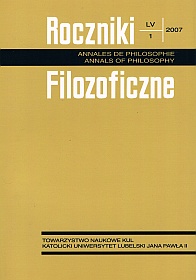Theodicy without unde malum? Marilyn McCord Adams’s Response to the Problem of Evil
Abstract
The aim of this paper is to present the main strands of the Marilyn M. Adams’s response to the problem of evil in contrast with the mainstream of the analytic theodicy. The most important difference between the standard analytic attitude to the problem of evil and that proposed by Adams is that she abandons the question about God’s reasons i.e. goods which could be morally sufficient reasons for permitting bad states of affairs to occur, especially instances of apparently pointless suffering (so-called gratuitous evils). Adams concentrates on the problem of horrendous evils i.e. evils which constitute a threat to the meaning of one’s life and prima facie undercut all positive value of one’s existence. Adams, inspired by the French thinker Simone Weil, seeks the resolution of the problem of evil in the crucified Christ’s identification with sufferers (and also in the idea of universal salvation). In the paper I analyse some weaknesses of the Adams’s theodicy, esp. I raise a query if we can give up the oldest question about evil: unde malum.
References
Adams M. M.: Divine Justice, Divine Love and Life to Come, „Crux” 13 (1976/1977), s. 13-28.
Adams M. M.: Duns Scotus on the Goodness of God, „Faith and Philosophy” 4 (1987), s. 486-505
Adams M. M.: Hell and the God of Justice, „Religious Studies” 11 (1975), s. 433-447.
Adams M. M.: Horrendous Evils and the Goodness of God, [w:] taż, R. M. Adams (red.), The Problem of Evil, Oxford: Oxford University Press 1990, s. 208-221.
Adams M. M.: Horrendous Evils and the Goodness of God, Ithaca: Cornell University Press 1999.
Adams M. M.: Problems of Evil: More Advice to Christian Philosophers, „Faith and Philosophy”, 5 (1988), s. 121-143.
Adams M. M.: Theodicy without Blame, „Philosophical Topics” 16 (1988), s. 215-245.
Allen D.: Natural Evil and the Love of God, [w:] M. M. Adams, R. M. Adams (red.), The Problem of Evil, Oxford: Oxford University Press 1990, s. 189-208.
Alston W. P.: The Inductive Argument form Evil and the Human Cognitive Condition, [w:] D. Howard-Snyder (red.), The Evidential Argument from Evil, (Indiana Series in the Philosophy of Religion), Bloomington: Indiana University Press, s. 97-125.
Bergson H.: Dwa źródła moralności i religii, tł. P. Kostyło SJ, K. Skorulski SJ, Kraków: Znak 1993.
Chisholm R. M.: The Defeat of Good and Evil, [w:] M. M. Adams, R. M. Adams (red.), The Problem of Evil, Oxford: Oxford University Press 1990, s. 53-68.
Draper P.: Pain and Pleasure: An Evidential Problem for Theists, „Noûs” 23 (1989), s. 331-350.
Hefling Ch.: Christ and evil: Assessing an aspect of Marilyn McCord Adams’s theodicy, „Anglican Theological Review” 83 (2001), s. 869-882.
Hick J.: Evil and the God of Love, London: MacMillan Press 1977.
Howard-Snyder D.: Introduction: The Evidential Argument from Evil, [w:] tenże (red.), The Evidential Argument from Evil, (Indiana Series in the Philosophy of Religion), Bloomington: Indiana University Press, s. xi-xx.
Howard-Snyder D. & F.: Is Theism Compatible with Gratuitous Evil?, „American Philosophical Quarterly” 36 (1999), s. 115-130.
Mackie J. L.: Cud teizmu. Argumenty za istnieniem Boga i przeciw istnieniu Boga, tł. B. Chwedeńczuk, Warszawa: PWN 1997.
Mackie J. L.: Zło a wszechmoc, tł. T. Baszniak, [w:] B. Chwedeńczuk (red.), Filozofia religii, Warszawa: Spacja 1997, s. 217-232.
Otte R.: Evidential arguments from evil, „International Journal for Philosophy of Religion” 48 (2000), s. 1-10.
Pike N.: Hume on Evil, [w:] M. M. Adams, R. M. Adams (red.), The Problem of Evil, Oxford: Oxford University Press 1990, s. 38-52.
Plantinga A. C.: Bóg, wolność i zło, tł. K. Gurba, Kraków: Znak 1995.
Plantinga A. C.: The Nature of Necessity, Oxford: Clarendon Press 1974.
Quinn P. L.: Marilyn McCord Adams, Horrendous Evils and the Goodness of God, „The Philosophical Review” 110 (2001), no. 3, s. 476-479.
Rowe W. L.: Evil and the Theistic Hypothesis: A Response to Wykstra, [w:] M. M. Adams, R. M. Adams (red.), The Problem of Evil, Oxford: Oxford University Press 1990, s. 161-167.
Rowe W. L.: The Problem of Evil and Some Varieties of Atheism, [w:] M. M. Adams, R. M. Adams (red.), The Problem of Evil, Oxford: Oxford University Press 1990, s. 126-137.
Swinburne R.: Providence and the Problem of Evil, Oxford: Clarendon Press 1998.
Szestow L.: Ateny i Jerozolima, tł. C. Wodziński, Kraków: Znak 1993.
Tischner J.: Filozofia dramatu, Kraków: Wydawnictwo Znak 1998.
Van Inwagen P.: Problem zła, tł. M. Iwanicki, M. Osmanski, „Znak” (2006), nr 616, s. 80-113.
Van Inwagen P.: The problem of Evil, the Problem of Air, the Problem of Silence, [w:] tenże, God, Knowledge and Mystery. Essays in Philosophical Theology, New York: Cornell University Press 1995, s. 66-95.
Wilks I.: The structure of contemporary debate on the problem of evil, „Religious Studies” 40 (2004), s. 307-321.
Wodziński C.: Światłocienie zła, Wrocław: Fundacja na Rzecz Nauki Polskiej 1998.
Yandell K. E.: The Greater Good Defense, „Sophia”, 13 (1974), s. 1-16.
Yandell K. E.: The problem of Evil and the Content of Morality, „International Journal for Philosophy of Religon” 17 (1985), no. 3, s. 139-165.
Copyright (c) 2007 Roczniki Filozoficzne

This work is licensed under a Creative Commons Attribution-NonCommercial-NoDerivatives 4.0 International License.





